
Finding the right keywords to target on Google is a tedious process and that's why we're happy to bring you this Keyword Chef review!
To ensure your website ranks high in search engine result pages (SERPs), you need to target the right keywords. But how do you know which keywords have the best chance to rank? And how do you find them?
Enter Keyword Chef – a powerful keyword research tool that helps you find ranking-ready keywords to target in minutes, not hours.
In this Keyword Chef review, we'll cover what Keyword Chef is, how it works – and, more importantly – how you can use it to get the maximum results for your SEO efforts.
Let's get started!
If you want to save time and try Keyword Chef out for yourself, you can claim your Keyword Chef free credits here.
Keyword Chef Review
-
Ease of Use
-
Quality Features
-
Customer Service
-
Price
Pros and Cons
Keyword Chef makes it simple to find keywords you can rank on page 1. It scrapes for the highest value, least competitive keywords so you can ensure you're writing about the best topics. It's made by bloggers for bloggers. Try Keyword Chef out for free here!
Pros
- Finds quality keywords
- Saves time
- You don't waste your resources writing on topics that won't rank
- Accessible, credit-based pricing
Cons
- Fast credit consumption
- It's only a keyword research tool
- Does not optimize your content
What is Keyword Chef?

At its core, Keyword Chef is a keyword tool that helps you find keywords for your website or blog that are “nearly guaranteed to rank”.
Keyword Chef does this by streamlining the manual process of finding underserved keywords for you.
It automatically checks the SERPs for thousands of keywords and identifies undervalued ones. This way, you can quickly perform keyword research, so you can rank (with minimal effort).
It also uses a unique algorithm to isolate quality keywords with real search intent. That means no more sifting through meaningless metrics, junk keywords, or high-competition keywords that are hard to rank.
Instead, Keyword Chef makes things a lot more simple! They show low-hanging fruit and provide topics you'll want to write about.
What Are The Benefits Of Using Keyword Chef?
Let's explore the benefits of this keyword research tool.
Finds High-Quality Keyword Suggestions That Other Tools Miss
One of the most significant benefits I've found with Keyword Chef is that the tool delivers truly valuable, high-quality keyword suggestions. When I use other tools, it's often a guessing game about which keywords have good ranking potential.
But with Keyword Chef, you know you will find low-competition keywords to rank high in the SERP results. This can make a huge difference in ranking on Google and getting traffic to your website or blog without a colossal backlink profile.
Unlike other keyword tools, Keyword Chef doesn't rely on just search volume to determine the best keywords for your site. Instead, Keyword Chef gives you keyword searches that yield traffic because it uses an advanced algorithm that analyzes quality. It looks at things like search intent and predicted difficulty so that you can create content with a higher chance of ranking on Google.
Uncovers Keywords With Real Search Intent and Removes Junk
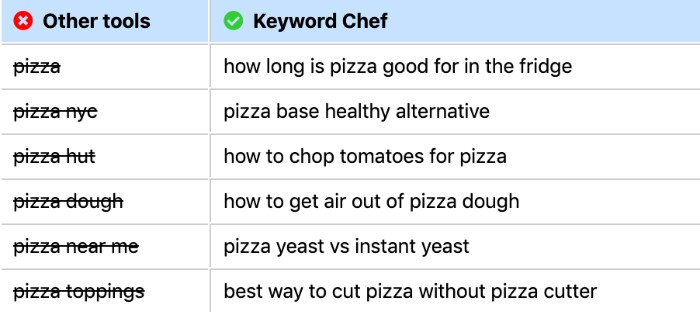
Are you tired of your standard keyword research tools that deliver thousands of keywords with little to no search intent? With Keyword Chef, you can easily find targeted keyword suggestions and eliminate the junk data that most other tools use. So what's this all mean?
When finding keywords for your website or blog, it's often best to use long-tail keywords.
These are more specific keywords with a lower search volume but tend to convert better because they're more relevant to the searcher's goal.
Super User-Friendly Interface
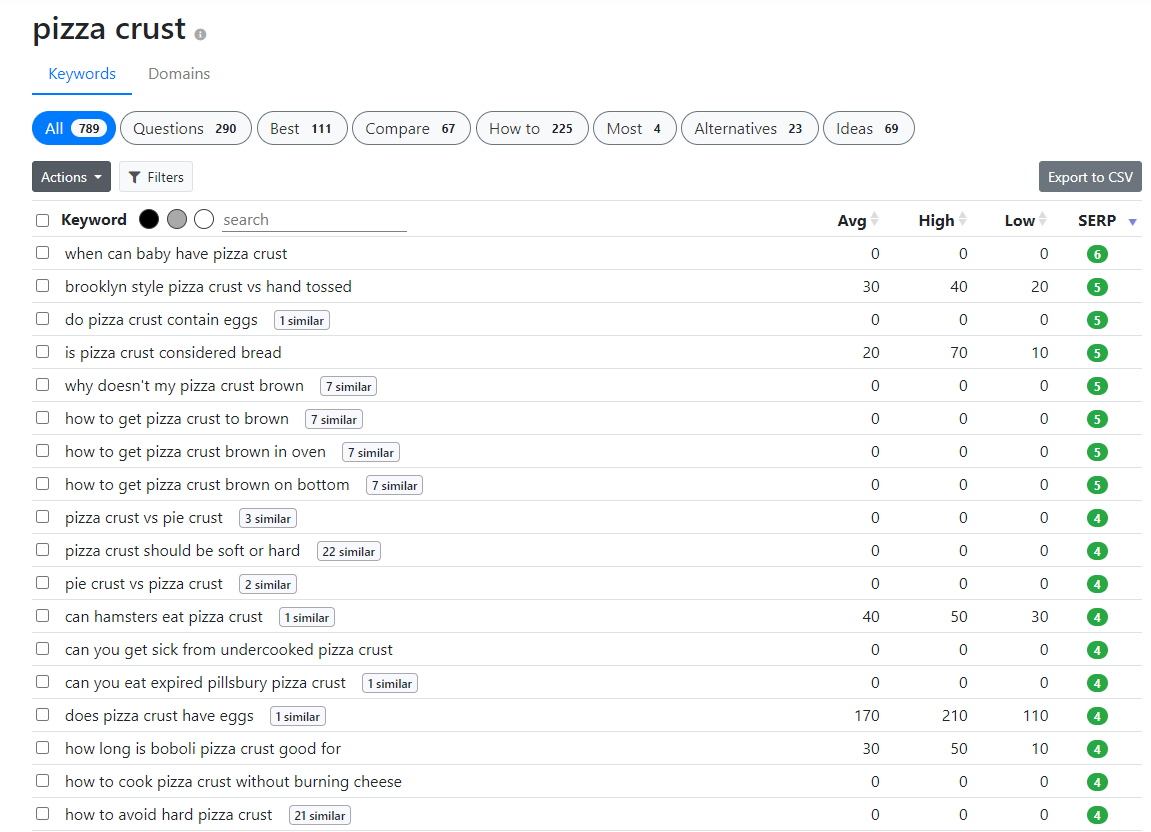
When I first started using Keyword Chef, I was surprised at how quickly I could get up to speed. The user interface is super intuitive. If you can use Google search, then you can use Keyword Chef.
And because this SEO tool does all of the hard work for you (checking SERPs and identifying valuable keywords), it doesn't take long to start finding the best keywords for your website. As a result, even beginners can find quality keyword ideas without feeling overwhelmed by the process.
Automates an Otherwise Manual Process
Google autocomplete used to be a way to find good keywords – and it still is. But it takes a lot of time to research with Google Autocomplete manually – especially if you want to cross-reference the search volume with a tool like Keywords Everywhere.
With Keyword Chef, you don't need to do any of that. Instead, the tool automatically checks the SERPs and creates a list of keywords for you – saving you hours and days in manual research.
Zero-Monthly fees
Unlike other keyword tools and tools, Keyword Chef is an affordable option – and it's even free to use. There are no monthly subscription fees or additional charges to pay.
You only pay when you want more than the basic features – which is reasonable for a tool that can help your website rank higher in Google! Other SEO tools can cost hundreds of dollars each month, and Keyword Chef is accessible for a free trial.
Keyword Chef Features
Discover Feature

You'll spend most of your time inside the Discover tab within the Keyword Chef dashboard. It feels like a normal Google or Bing search engine, and you'll be able to find long-tail keywords and related topics that you may not have thought of before. It functions primarily based upon:
- Google Autocomplete Scraping
- Search Intent, Keyword Clustering
Google Autocomplete Scraping (Wild Card Searches)
The Google Autocomplete tool is great for finding long-tail keywords. Specifically, it makes it easier to find keywords with a high potential to rank (and get traffic) in search engines. Within Keyword Chef, the Google Autocomplete tool is automated. So it makes finding long-tail keywords much easier and faster than doing it the old-fashioned way.
Here's how it works:
It goes through the alphabet, scraping all the Google Autocomplete suggestions. But it doesn't stop there! Keyword Chef also incorporates wildcard search. So if you're looking for keyword ideas related to “dog grooming*” (see below an explanation of the *), Keyword Chef will also pull up results such as “dog grooming products”, “dog grooming brushes”, and other relevant topics.
Keyword Clustering
The Keyword Clustering tool is another helpful feature of Keyword Chef. It allows you to group keywords together based on their top-level topics and related subtopics.
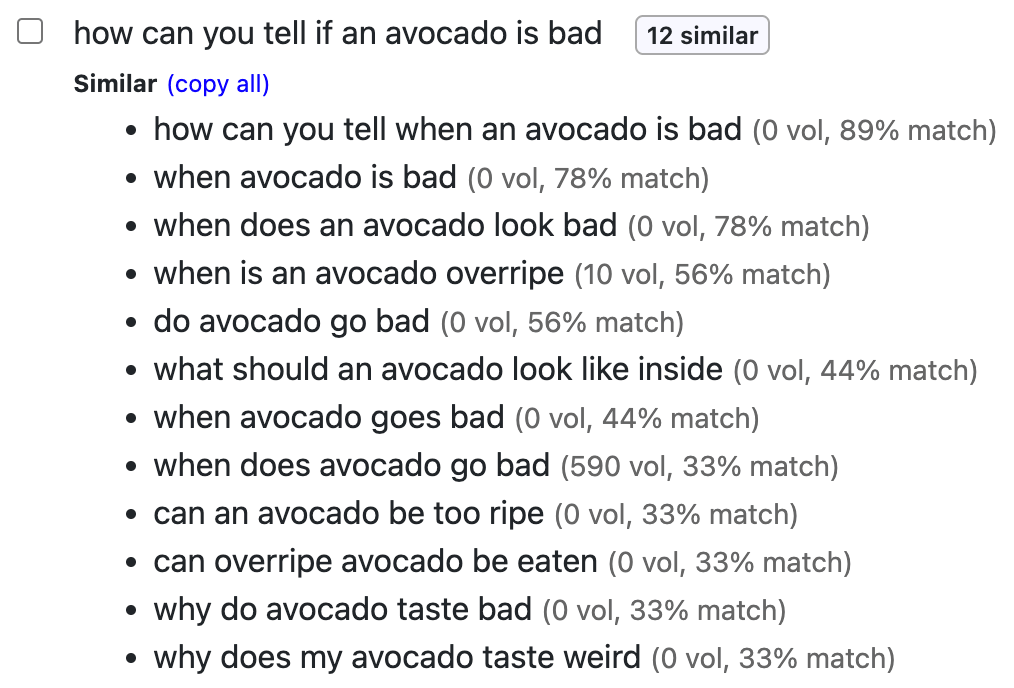
This makes it easy to organize your keywords into a hierarchy (based on search intent) so that you can boost your search traffic more effectively.
Here's how it works:
KW Chef analyses the SERPS for every keyword. When two or more keywords meet the minimum number of matching links, they are automatically grouped. KW Chef will give you the search volume and degree of similarity among the keywords in the cluster.
Other Keyword Categories
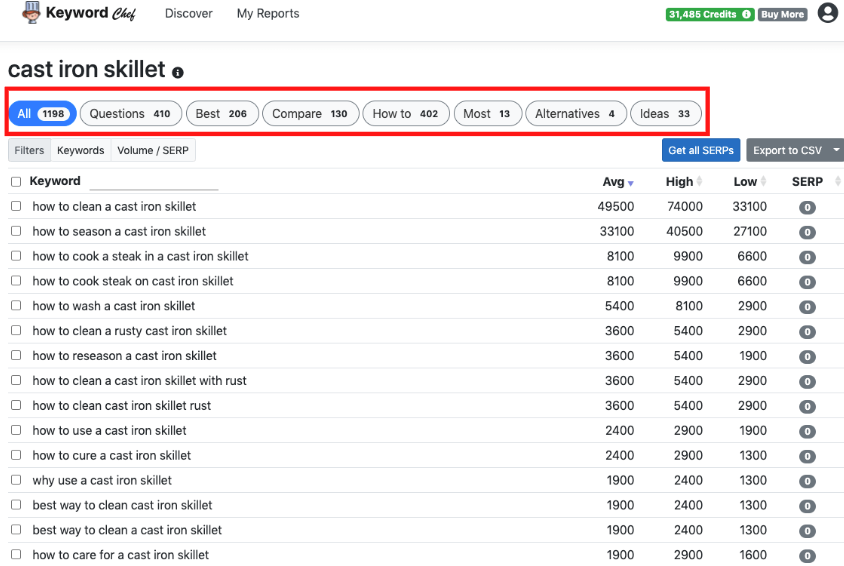
There are several different keyword categories that you can search for in Keyword Chef. Each category serves another purpose and can be helpful for different types of content.
Questions
The questions category is good for finding informational keywords. People are asking questions related to the keyword, and your content can provide the answer. For example, if you search for “dog breeds,” you might find keywords like “what are the best dog breeds for families” or “which dog breed lives the longest.”
Best
The best keywords are suitable for product reviews. For example, if you search for “dog beds”, you might find keywords like “best dog beds for large breeds” or “best orthopedic dog beds”. This category can be helpful if you're trying to create content that ranks well in search engines.
Compare
The compare keywords compare two or more search terms against each other. For example, if you search for “large dog breeds”, you might find a keyword like “large breeds vs. small breeds”. This category can be helpful if you're trying to create content that compares two products, services, or ideas.
How-To
The how-to keywords contain the word “how to.” For example, if you search for “how to potty train a puppy”, you might find keywords like “how to potty train a puppy in 7 days” or “how to potty train a puppy without a crate”. This category can be helpful if you're trying to create content that provides step-by-step instructions.
Alternatives
The alternative keywords contain the word “alternative” and provide options for those looking for something different from the norm. For example, if you search for “small dog breeds,” you might find keywords like “alternative small dog breeds” or “non-shedding small dog breeds.” This category can be helpful if you're trying to create content that offers an alternative perspective.
Ideas
The idea keywords contain the word “ideas,” and Pinterest dominates many search results. For example, if you search for “dog birthday party ideas,” you might find keywords like “dog birthday party ideas Pinterest” or “unique dog birthday party ideas.” This category can be helpful if you're trying to create content that provides creative ideas.
SERP Checker to Identify Low Competition
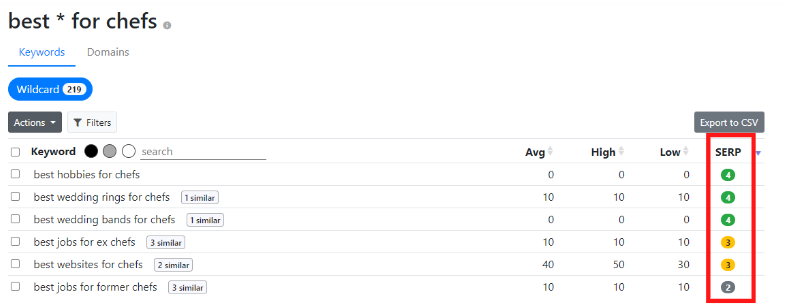
As an SEO, you know that finding forums and other user-generated content on the first search engine results page is historically, a surefire way to rank highly.
The software automatically finds and highlights the following sites for you, so you can quickly identify which ones are worth pursuing.
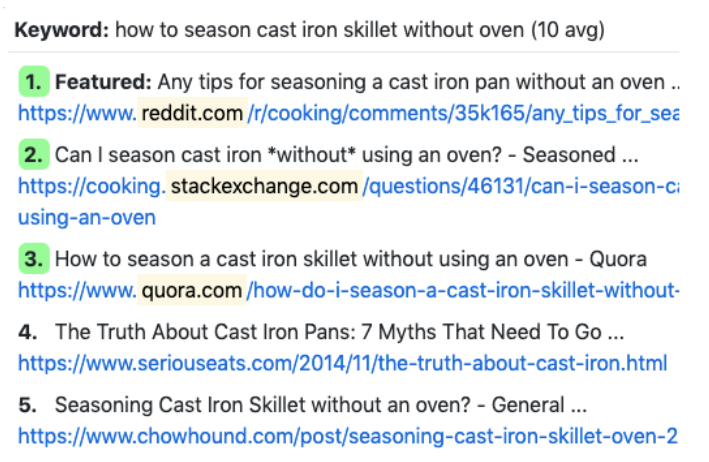
Sites like Reddit, Quora, and Traditional Forums
These sites have historically been relatively easy to outrank because they're not optimized for SEO.
While they have massive backlink profiles and a very high DR, they're comprised of thousands to millions of pages of user-generated content. Recent updates have shown these sites ranking higher, though and even outranking blogs.
Free Blogs
Free blogging platforms like Blogspot and Wix are also reasonably easy to outrank. This is because they don't have a lot of authority and tend to have few high-quality links pointing to them.
Additionally, these platforms are usually less well-optimized for SEO, so getting your content to rank above them is relatively easy.
This is more so to get ideas. Pinterest is a popular social sharing platform, and like forums, people will post all sorts of topics and ideas without worrying about ranking.
These can be great options for keywords after considering popular pins show a proven audience and interest.
For instance, idea keywords usually contain the word “ideas” and tend to generate many results from Pinterest. An example of an idea keyword would be “Dog birthday party ideas.”
These keywords can be helpful when you're looking for inspiration or creative solutions.
Tips for Finding the Best Keywords With Wildcard search
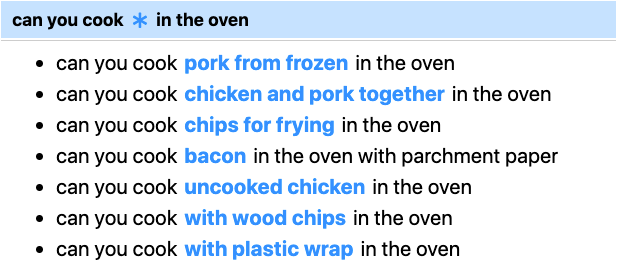
A wildcard search is a query that includes an asterisk (*) in place of one or more letters. For example, if you enter the search phrase “best dog food for *,” Google will return results for “best dog food for large dogs,” “best dog food for small dogs,” and so on.
Wildcard searches can be helpful when looking for information on a specific topic, but you need to figure out the exact phrase to use.
In the case of our dog food example, a wildcard search would help you find results even if you needed to know whether you should be searching for large or small dogs.
Here's how to use wild card search within Keyword Chef:
- Start by typing in the topic you're interested in. For example, if you're looking for information on SEO, you might type “SEO tips.”
- Use the asterisk (*) within different parts of your search phrase. For example, “* SEO tips” or “SEO tips for *.”
- Check the search results for ideas and inspiration. Chances are, you'll find some keywords you wouldn't have thought of otherwise. Some possible results would be SEO tips for beginners, SEO tips for small businesses, and SEO tips for WordPress.
- Experiment with variations of your keyword phrase until you find one that yields the best results.
Case Study: Stephen Hockman Used Keyword Chef to Start Ranking in 24 Hours

Stephen Hockman, an SEO expert, used Keyword Chef to publish 45 articles in 3 months. The articles ranged from 1000 to 1500 words, and 95% of them ranked in the top 10 SERPs in 24 hours. Each piece published generated 3 to 1,507 visits per URL.
Recipe For Success:
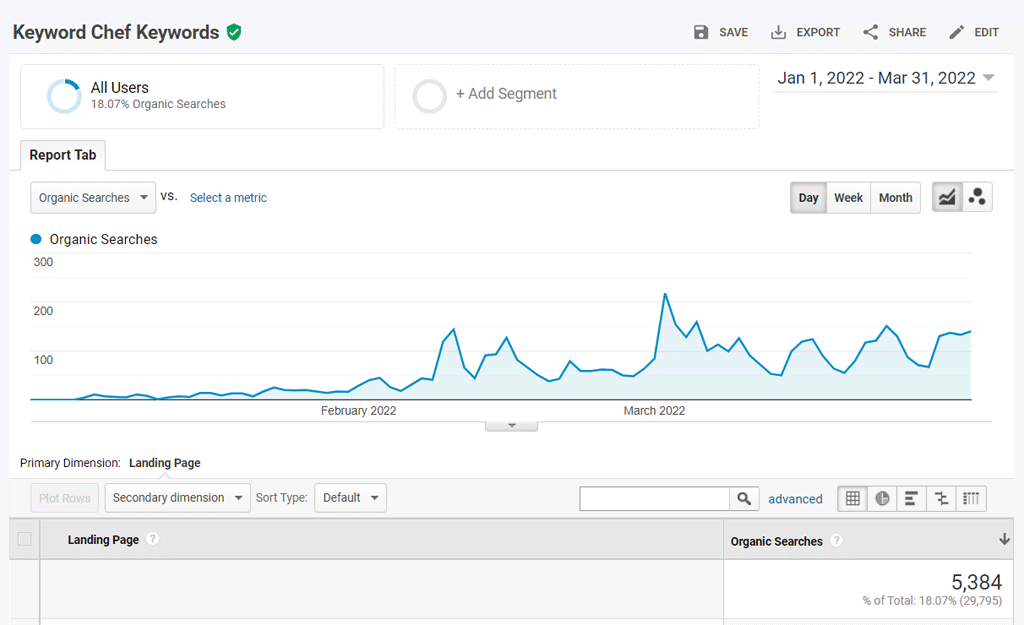
To have success, he focused on one area of topical relevance. For example, since he is in the SEO niche, he focused his topical relevance on keywords before moving to other topics.
He also made use of the Wildcard and Questions keyword categories and focused on questions like “what, “why,” and “how.” In addition, he only used keywords with a SERP Score of 1 and above for targeting.
This ensured that only one user-generated content site ranked in the top 10 SERPs. He then matches the search intent for these keywords with quality content in a way favorable to the Google algorithm.
Read the entire case study here.
Keyword Chef Pricing Structure
Keyword Chef offers a credit-based model, which only charges for what you use. That means there are no monthly or yearly fees.
It's broken down into three plans based on volume:
- Starter: $20 (0.008 per keyword)
- Plus: $100 (0.005 per keyword)
- Pro: $250 (0.002 per keyword)
Here's the best part:
Keyword Chef credits never expire, and you can return to your reports anytime. This differs from other keyword research tools like Ahrefs or SEMrush, which can burn a hole in your pocket if you're just starting.
Keyword Chef Alternatives
If Keyword Chef isn't your cup of tea, there are a few other SEO tools we recommend:
RankIQ
RankIQ is an AI-powered SEO toolkit that helps find the perfect balance of keywords – popular enough to generate traffic but not so widespread that they're impossible to rank. In addition to finding the right keywords, Rank IQ also provides information on the strength of competition and how long it will take to rank for them on average.
In addition, the Content Optimizer tool helps you fine-tune your post structure for optimal search engine ranking. As a result, Rank IQ covers more steps of the SEO process than keyword research, making it a valuable resource for anyone looking to improve their blog's reach. While Keyword Chef's pricing is based on usage, Rank IQ charges $49 monthly.
In comparison, Keyword Chef does offer a free trial and a usage-based pricing model, but it also lacks content creation and optimization features.
Learn more in our complete RankIQ review!
WriterZen
WriterZen is a comprehensive writing tool covering all aspects of the writing process, from topic discovery to SEO optimization and plagiarism checking. It's also more expensive than Keyword Chef but offers many more features and functionality. In particular, WriterZen's GPT-3 powered A.I. Assistance is a big step up from Keyword Chef's primary content creator. With WriterZen, you can get help with brainstorming, research, writing, and editing.
Keyword Chef Review Conclusion – Is Keyword Chef Worth It?
All in all, Keyword Chef is an indispensable tool for an online marketer, especially when starting a site. If you're not using it, you're missing out on a lot of potential traffic (and profits). Whether you're a small business owner getting your feet wet or an experienced marketer, Keyword Chef has the features and functionality you need to find hidden, high-value keywords in any niche. So if you're looking for low-competition keywords that will convert into real traffic and revenue, sign up for your free trial here.
For related reading, check out:
The post Keyword Chef Review: The Easiest Way to Find Solid Topics for Quick SEO Wins? appeared first on Niche Pursuits.

